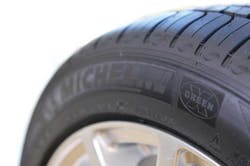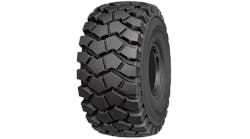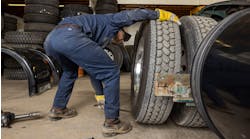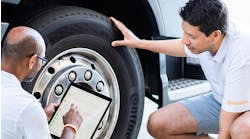We asked tire manufacturers this question: “In addition to eco-friendly tires (see also, "Low rollers, high road"), does your company employ any other green initiatives in the tire manufacturing process?” Here’s what they had to tell us. They’re doing a lot more than many people may realize.
Bridgestone Americas Tire Operations LLC
The Bridgestone Group has long been an industry leader in green initiatives. In every corner of the company, we are using the power of our global technologies and our innovative teammates to do the right things for our planet and the environment.
Our “One Team, One Planet” environmental and energy initiatives are making a difference every day. Our concern for the environment in material selection, production processes and logistics continually improves our environmental performance.
We have the only two tire manufacturing facilities in the world certified by the Leadership in Energy and Environmental Design (LEED) Green Building Rating System administered by the U.S. Green Building Council. We also have a Gold LEED certified retail facility from which we are using best building practices when constructing our new retail facilities.
Our global goal is to reduce CO2 from an entire product’s life cycle by 35% per sales. Another goal is to improve tire rolling efficiency by 25%, resulting in less fuel use and CO2 emissions while driving.
We also will reduce the overall weight of our tires and resources needed to produce them while maintaining performance. All scrap tires from the manufacturing and retail groups are recycled or beneficially reused.
In operations, Bridgestone embraces new technologies. Clean, efficient hydrogen fuel cells power material movers at our tire plants in Warren County, Tenn., and Aiken County, S.C. We reduce our energy consumption by using low energy lighting and high efficiency fans in our plants. Through energy savings measures in our plants, the company saved $2.8 million in 2010 alone and continues to reduce greenhouse gasses on our way to achieving a 25% reduction by 2020.
Since 2005, we’ve reduced waste per ton of product by 40%. We’ve increased waste recycled per ton by 25%. No scrap tires from our manufacturing facilities go to the landfill — they are all beneficially reused. All Bridgestone Americas manufacturing facilities are ISO 14001 certified. Also, the new Akron, Ohio, Technical Center is being built to gold-level LEED certification.
[PAGEBREAK]
Cooper Tire & Rubber Co.
Cooper Tire works hard to protect the environment by considering the environment in the design of its products and processes. Cooper also helps prevent pollution, using energy and resources wisely, strictly controlling emissions, reducing waste, providing proper training and driving continuous improvement in all that we do.
We have not only developed more fuel-efficient tires, we have also focused on “greening” our processes. To that extent, Cooper has earned the U.S. Department of Energy’s Energy Star Partner designation, distinguishing it as the sole tire manufacturer to earn such an honor and as an industry leader in completing green activities.
Cooper’s new 804,000-square-foot warehouse and distribution center in Franklin, Ind., has earned Gold certification status under the LEED Green Building Rating System administered by the U.S. Green Building Council. The system is a voluntary, consensus-based standard to support and certify successful green building design, construction and operations.
LEED certification is attained by incorporating “green” features into the design and construction of the building. Cooper is one of only two tire companies to boast possession of a LEED-certified building. Moreover, the Franklin facility is the largest gold-LEED-certified distribution center in the U.S., and one of the largest LEED-certified buildings in the world.
Cooper’s Texarkana, Ark., plant recently received a “Save Energy Now” Award from the U.S. Department of Energy (DOE). The facility is one of just 93 in the U.S. to merit an Energy Saver award. The award is presented to plants that achieve more than 7.5% in total energy savings.
The plant also won the 2009 Arkansas Environmental Federation Diamond Award for Excellence in Environmental Leadership.
This award is presented annually to the most deserving manufacturing/industrial entity demonstrating initiative and innovative leadership in environmental affairs. The Texarkana plant’s Diamond Award recognizes the plant’s reduced manufacturing scrap generation, reduced landfill usage, energy and water conservation, and internal recycling.
Also, Cooper’s Tupelo, Miss., plant was recently recognized as an environmental leader with The Mississippi Department of Environmental Quality by being accepted into its enHance program. enHance is a voluntary stewardship program begun in 2009 that recognizes committed environmental leaders who accomplish goals beyond their legal requirements. Cooper is one of only 16 entities in the state of Mississippi to be recognized at the Leader level.
Federal Corp.
Besides just focusing on producing high quality products, Federal is committed to protecting the environment and takes corporate responsibilities to comply with environmental policies and minimize pollution. Federal applies the following principles regarding environmental issues:
1. complying with environmental regulations and other related criteria in the factory.
2. emphasizing water conservation through reducing waste and recycling water.
3. continuously improving product quality, manufacturing technology and enhancing quality control in order to effectively minimize defective products to prevent pollution.
4. continuously improving and minimizing odor released by irregular rubber mixture and reducing dust to minimize air pollution and prevent complaints from nearby residents.
5. monitoring “major construction works” closely to prevent pollution and accidents.
Continuously educating employees to execute environmental conservation practices and communicating with suppliers/contractors to comply with all applicable environmental rules and regulations are additional goals.
[PAGEBREAK]
GITI Tire (USA) Ltd.
GITI Tire (USA) Ltd. is playing a major role in helping protect 1,000,000 acres of rainforest in Sumatra, Indonesia. These areas are considered as one of the most critical ecosystems in the world, containing over 400 species including the Sumatran tiger and orangutan.
GITI Tire consumes annually about 525,000 metric tons of coal, or the equivalent of about one million tons of CO2, or 270,000 metric tons of carbon emitted into the atmosphere.
Protecting these forest areas from conversion into vegetation with lower biomass (tree plantations or agriculture) conserves about 100 tons of carbon per hectare, or 26 million tons of carbon in total, which is equivalent to about 100 years of carbon emissions resulting from GITI Tire coal burning.
There are also carbon benefits by improving the conservation of the nearby Lake Toba watershed forest, and those benefits accrued from reforestation of community land in the buffer zones of all three forest areas.
Goodyear Tire & Rubber Co.
Goodyear has a comprehensive, well-defined Environmental, Health and Safety (EHS) program that continues to evolve as the global team works with all global operations to make our company more sustainable.
For many years, Goodyear has followed sustainability practices and worked hard to be a responsible neighbor in every community in which we operate. One of the first internal awards created by the company was a conservation award introduced in 1947 to encourage environmentally sound soil management. In the company’s early years, our sustainability efforts focused on establishing parks and recreation areas in local neighborhoods and actively participating in civic organizations and leadership groups.
In the early 1970s, Goodyear established a formal energy conservation program and began energy reduction activities at every company location. We added greenhouse gas (GHG) emissions to our standard monthly report in the late 1980s and, in the 1990s, began releasing annual reports on our activities and progress in the area of EHS.
Our long-established safety and environmental programs make our workplaces and communities safer and healthier. The programs have evolved as we continually improve our performance.
Today, Goodyear has a formal EHS organization that is responsible for safety, compliance, sustainability and product stewardship. After the group completed an analysis of our environmental footprint that clearly showed GHG emissions as our primary issue, it was determined that improving fuel efficiency in our products could provide a positive impact.
Hankook Tire America Corp.
Hankook Tire adopted an environmental management system early on and has been proactive in implementing global environmental protection initiatives. Our sustainable environmental management practices include resource circulation, environmental management, minimization of environmental impact, setting up an integrated environmental, health and safety management system and increasing our eco-friendly product lineup.
In the area of tire manufacturing, Hankook Tire has adopted the following measures as part of our environmental management system at a number of our manufacturing facilities:
• waste control and recycling — generating steam energy from incinerator waste heat.
• air quality control — application of high efficiency regenerative combustion methodology, testing of bio-filters to reduce odors.
• water quality control — promoting waste water recycling, monitoring a nonpoint pollution source management system, operating a real-time water quality telemonitoring system.
• hazardous substance control — signing a voluntary agreement to reduce use and discharge of chemical substances, improved processes to protect flying pollutants.
• maximizing operational efficiency.
• using clean energies at all plants.
• testing the use of new technologies to further reduce environmental impact.
Hankook’s tires are designed in consideration of their eco-friendliness for the duration of their life cycle, and minimize the use of polycyclic aromatic hydrocarbons (PAH).
Hankook employs “Kontrol Technology” (K for kinetic) to develop its tires. Kontrol Technology is Hankook Tire’s technology philosophy which reflects how the tire should perfectly control the interaction between the driver, the vehicle and the road while in motion. In addition AL11, AL07+ and DL11 are designed using Hankook’s e3 (pronounced e-cubed) technology which focuses on the three main areas of energy, economy and environment.
[PAGEBREAK]
Kumho Tire U.S.A. Inc.
Kumho Tire understands its responsibility towards the environment and is devoted to improving the world we live in.
Kumho Tire takes proactive steps toward research and eco-friendly management efforts set with global standards. With consumer needs and performance in the forefront of every move, Kumho Tire is constantly seeking eco-friendly technology.
Kumho Tire is taking the environment friendly features — lightweight, fuel-efficient, low noise, and long life cycle — beyond its environment label certified products. They include snow tires and UHP tires with special, environmentally friendly silica compounds.
Parent company Kumho Tire Co. Ltd.’s Gok-Sung, South Korea, factory is located on the upper part of the Sum-Jin River, an area where nature is in its purest form. It is the home of many wild animals and fish. In an effort to preserve the wildlife and the beauty of the surrounding area, Kumho Tire has pledged to prevent the pollution of the river with a reverse osmosis facility that recycles waste water and consistently monitors pollution levels.
In addition, the factory operates facilities that diminish air pollutants. Industrial waste is recycled. Steam is also reused to save energy. Kumho Tire also utilizes High Aromatic (HA) oil-free agents in the manufacturing of tires. Kumho Tires maintains a strong focus on being environmentally responsible.
Michelin North America Inc.
Michelin has built tires using “Green X” technology since 1992. To manage the environmental performance of its production plants, Michelin has developed a propriety standard, known as the Michelin sites Environmental Footprint (MEF).
Reported quarterly, MEF data are an integral part of the group’s management indicators, reflecting a commitment to reducing the footprint by 35% in 2015 compared with 2005. By 2010, the improvement since 2005 had already reached 30%, thanks in large part to effective waste management and the deployment of good energy practices.
In addition, as a corporate initiative, Michelin hosts the annual Challenge Bibendum, the largest collection of alternative fuel vehicles on the planet. OEMs and policy makers all over the world come together to discuss and display the latest technologies that facilitate greater sustainable mobility. This year, the event will be held in Berlin, Germany, from May 18-21.
Pirelli Tire North America
Pirelli’s Green Performance technology permits the reduction of fuel consumption and minimizes environmental impact due to the use of eco-sustainable materials which last longer and produce less noise when on the road.
Pirelli has always been very attentive to environmental issues. The company has developed a series of technologies capable of reducing the environmental impact of its products through their entire life cycle from production to disposal.
Our range of green products covers all production segments and is continually evolving, as seen by the recent launch of the Cinturato P1, already in line with the latest European environmental legislation. The sale of green products represented 37% of total revenue in 2010.
Pirelli also partners with Go Green Auto Rally (GGAR) that teaches drivers the fundamentals of efficient driving through endurance racing principles. Drivers who take part in the free program and use the free smartphone app can save up to 25% off their fuel bills through fuel-efficient driving practices. Last year GGAR won the Bronze Award at the 2011 Edison Best New Product Awards.
[PAGEBREAK]
Toyo Tire U.S.A. Corp.
The Toyo Tire North America manufacturing facility is a non-hazardous waste facility as well as a low air-emissions manufacturer. Toyo Tire is committed to assuring and maintaining an eco-friendly environment by continually searching for various recycling industries with compelling and economical alternatives with innovative tools, processes and technology to support the rubber product manufacturers.
Toyo’s scrap rubber and tires are distributed to these various industries which can support the diverse applications of recycling the rubber into a marketable product and further their own profit margins. These marketable items are recycled and produced into floor mats used in the fast-food and hotel industries. They are also used as paving and landscaping mulch, and on athletic fields.
To further support the environmental impact of the local community, Toyo began its efforts in 2007 to reduce landfill waste through recycling items such as cardboard, wood, metal, pallets, paper, plastics and aluminum cans. In 2009, to further enhance Toyo Tire’s environmental philosophy, Toyo began its “Used Oil Reclamation” process. This process has reduced the cost of an external used oil/water recycling disposal as well as the reduction of costs associated with the oil supplier. This process reclaims the used oil from the manufacturing equipment. The oil is collected, recycled and reintroduced back into the same manufacturing equipment.
Yokohama Tire Corp.
U.S.-based Yokohama Tire Corp. (YTC) is joining with its Japanese parent, Yokohama Rubber Co. Ltd. (YRC), to utilize its strength in technologies to protect the environment. This environmental mandate, part of the company’s “Grand Design 100” (GD100) Plan, is designed to have Yokohama harmonize its company-wide operations in everything from manufacturing to product design. The GD100 Plan coincides with the company’s 100th anniversary in 2017 and outlines how YRC will reduce the environmental impact made by every one of its products, including passenger and commercial tires as well as adhesives, sealants and golf accessories
Yokohama currently has zero-emissions of waste at all of its eight production sites in Japan, as well as at its Philippines product plant and two factories in China. The company will expand this approach to other facilities globally. It has achieved an 8% reduction in CO2 emissions, exceeding targets set by the Kyoto Protocol on climate change, and has been awarded the highest possible environmental rating by the Development Bank of Japan.
In the United States and worldwide, Yokohama’s manufacturing plants are ISO 14001-certified, which is an international specification of environmental management system that holds organizations to stringent environmental principles and audits.
Development of eco-friendly products is a significant GD100 objective. Yokohama’s environmentally friendly tires include the dB Super E-spec, a consumer passenger tire, which has been launched in the United States. YRC has developed a process that combines orange oil with natural rubber to form a new compound called “Super Nano-Power Rubber (SNPR),” which significantly reduces the proportion of petroleum products in the tire.
Yokohama additionally has a green racing tire, the Advan ENV-R2, which like the dB Super E-spec, contains orange oil. This compound allows for more natural and sustainable materials to be used, while increasing the grip capability in natural rubber.



